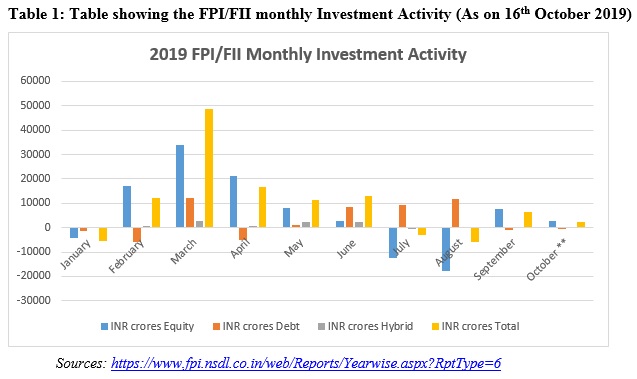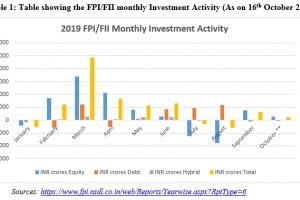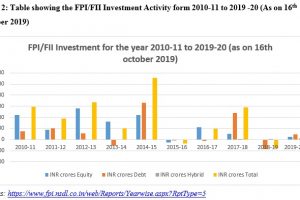Sudindra V R
Mr. Raghav one of my old friends called me in the Midnight 01:45 am with a long ring and I was surprised and shocked. He was under the impression that I will be having my lunch and can pick up the call. The call was from the USA to get information on Investment in the stock market. He is running a business of Personal Financial Planning and wanted to invest for his company as well as to build a foreign portfolio to his clients. After realizing, he apologized and informed me that he will call me as per Indian Standard Time. The next morning, I had a conversation with him and explained to him about the foreign investment in India.
Foreign investment can be made by two classes of investors: Foreign Portfolio Investment (FPI) and Person of Indian Origin (POI) /Non-Resident Indians (NRI). Deriving the residential status of a person is based on Income tax rules and FEMA regulation. Non-Resident Indians can invest in the Stock market/Secondary market, Initial public offers, Mutual Funds, Portfolio Management Services, Derivatives, Bonds and Alternative Investments. NRI should have any one type of account; Non-resident Ordinary (NRO) for income from India or Nonresident External (NRE) account to be maintained in Indian currency. The portfolio Investment scheme provides a facility for NRIs to acquire shares of Indian companies through regulated stock exchanges. To start an investment, NRI’s need to open a PIS-Portfolio Investment Scheme bank account, Trading and DEMAT account with SEBI registered broker in India. A portfolio Investment service account is required to monitor Investment Cap/limit in the secondary market. No Nonresidential Indians can proceed with Intraday trading/ Short selling, only cash/delivery based trading is allowed up to 5% of overall floatation in the market. For Investment in Mutual Funds and Initial Public offers no need to obtain a PIS bank account. NRI’s can purchase residential as well as commercial property without restriction in terms of numbers. But they cannot buy agricultural land/farmland with the exclusion of owning agriculture land through inheritance or gift. No NRI’s should invest in prohibited sectors as per regulations like Lottery business, Casino/betting, Chit fund, real estate business, activities are not open to private sectors, etc.
On the other hand, Foreign Portfolio Investment is categorized into 3 types; category 1 – Government and Government related entities, Category II – regulated broad-based funds, regulated persons (Bank, AMC, Portfolio Managers, and Investment Managers) and University funds/Pension funds or any other related funds registered with SEBI. Category III – all other FPI like Endowments, Charitable societies, trusts, foundations, Corporate bodies, Individual and family offices. Every Foreign Portfolio Investors need to register under the Security Exchange Board of India as Foreign Portfolio Investors to be eligible for Investment. If FPIs like to register, they need to submit documents such as; FPI application form, declaration, and undertaking, Ultimate beneficial owner letter, constitutional documents, Permanent Account Number card instruction and Know your Customer documents as per applicant category. All the investment in direct equity is regulated by the Security & Exchange Board of India, Reserve Bank of India and Stock exchanges in which FPI wants to invest. FPI’s alone is not sufficient to start investment activity and registration. It requires the appointment of legal representatives- any financial institution approved by Reserve Bank of India and selection of Designated Depository Participants (28 DDP’s are approved and authorized in India) to maintain the securities. Tax advisors who assist in tax obligations, designated banks who maintain foreign currency account/Indian rupee account and compliance officer, who monitor compliance to regulation/guidelines. To execute the transactions, FPI’s need to appoint trading, clearing and settlement members approved by SEBI or Stock Exchange members. Most importantly, the custodian services are essential to carry out servicing of securities in domestic.
The below tables show how FPI Investment activities performed in the last 10 years.
Foreign portfolio Investment Equity market in 2019 has decreased which depicts the slowdown in investment activity due to slowdown in the Economy. In the year 208-19, the FPI investment was deep declined and it is recovering slowly in the year 2019-20 (till 16th October 2019).
Conclusion: Mr. Raghav can invest in India as Foreign Portfolio Management Category III as Individual Clients or by creating trust and as a Person of Indian origin on Individual capaci
ty. Looking at the overall Economic condition and concern for Growth, cautiously he can enter into the Indian market. At individual capacity, it is very difficult to operate. He requires to build a network of registered DDP, Research firms, Financial Institutions, Custodians and other service providers to achieve the individual objectives / organizational objectives.
ty. Looking at the overall Economic condition and concern for Growth, cautiously he can enter into the Indian market. At individual capacity, it is very difficult to operate. He requires to build a network of registered DDP, Research firms, Financial Institutions, Custodians and other service providers to achieve the individual objectives / organizational objectives.
References:
- https://www.fpi.nsdl.co.in/web/Reports/Yearwise.aspx?RptType=5
- https://www.nseindia.com/int_invest/content/getting_started.htm
- https://www.fpi.nsdl.co.in/web/Reports/Yearwise.aspx?RptType=6
- https://www.sebi.gov.in/statistics
Disclaimer – The views, opinions, and content on this blog are solely those of the authors. ISME does not take responsibility for the content, which is plagiarized or not quoted.






